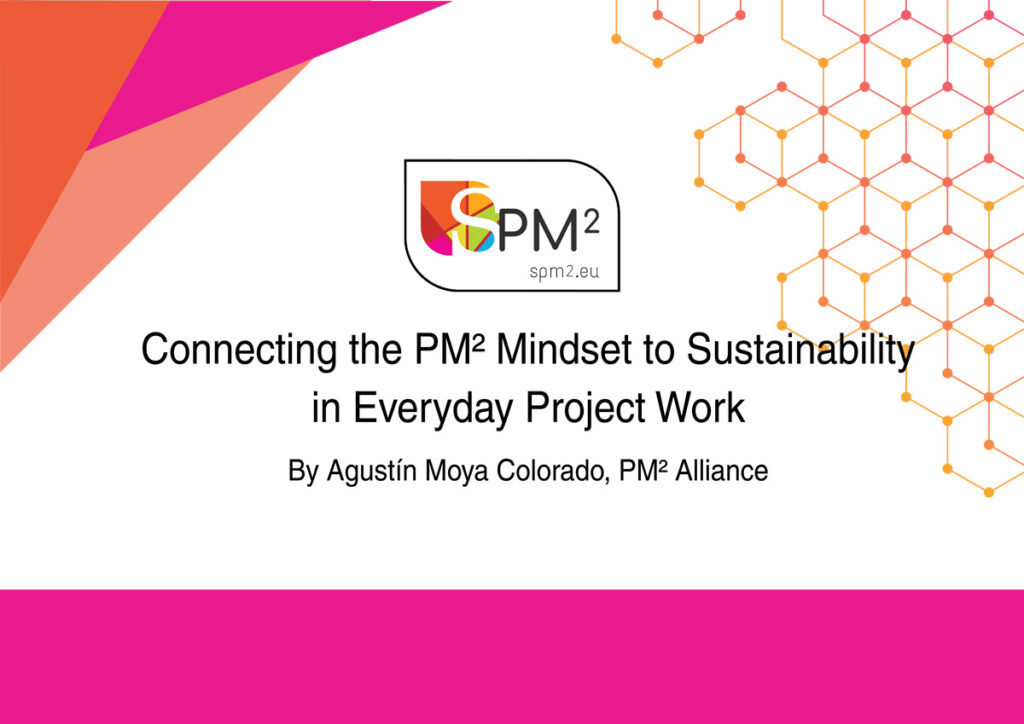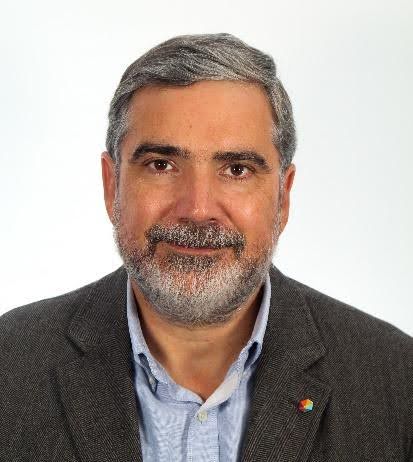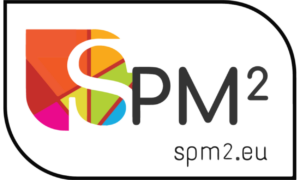
PM² at the service of transformation
Every project is, at its heart, an act of transformation. It aims to make something better—a community, a place, a system, a service. Yet in the rush to deliver outputs, we often lose sight of this transformative essence and its impact on the world around us. Sustainability reminds us to look beyond deliverables and deadlines—to the lasting value our projects bring to people and the planet.
The PM² methodology gives us a structured, human-centred way to keep the focus on what matters most: the PM² Mindset and its guidance to tailor PM²to the specific needs of organizations and projects. The key lies in one of PM²’s most powerful mindsets:
Project management methodologies are at the service of projects—not the other way around.
When we apply this lens to our PM² tailoring for our project, integrating sustainability into our daily work isn’t a new process or extra report—it’s a way of thinking and behaving that amplifies the positive impact of every action we take.
Sustainability as a State of Mind
Sustainability in projects isn’t achieved through a single checklist or framework. It begins with awareness and intentionality—the same qualities at the heart of the PM² Mindset.
PM² offers us a holistic set of 11 Mindsets that guide how we think, decide, and act. PM² encourages us to be mindful, accountable, open, and outcome-oriented. These are exactly the attitudes needed to integrate sustainability principles such as responsibility, equity, and long-term thinking. By expanding how we interpret each PM² mindset, we can also see how these Mindsets collectively nurture a culture of sustainability:
PM² Mindset:
Project Managers (PM) and project teams that practise PM²:
Connection to Sustainability
1️⃣ Apply PM² best practices to manage their projects.
Using PM² best practices and combining them with sustainability best practices ensures that sustainability principles are embedded in structured, consistent management processes that support responsible and transparent delivery.
2️⃣ Remain mindful that project management methodologies are there to serve projects and not the other way around.
Recognising that methodologies serve the project’s purpose allows sustainability goals to stay central to decision-making and not be overshadowed by procedural rigidity.
3️⃣ Maintain an outcomes orientation in relation to all projects and project management activities.
Sustainability reinforces the focus on long-term outcomes and enduring benefits rather than short-term outputs.
4️⃣ Are committed to delivering project results with maximum value rather than just following plans.
Applying sustainability principles ensures that value is defined not only economically but also socially and environmentally.
5️⃣ Foster a project culture of collaboration, clear communication and accountability.
Collaboration and transparency are essential to ensure all stakeholders share responsibility for sustainable practices and results.
6️⃣ Assign project roles to the most appropriate people for the benefit of the project.
Choosing competent and ethically responsible people helps strengthen sustainability integration through leadership and informed decisions.
7️⃣ Balance in the most productive way the often-conflicting project management “Ps” of product, purpose, process, plan, planet, people, pleasure/pain, participation, perception and politics.
Sustainability offers a guiding framework to balance these dimensions thoughtfully, ensuring planet and people are part of every trade-off.
8️⃣ Invest in developing technical and behavioural competences to become better project contributors.
Building competences in sustainability literacy and ethical awareness enhances long-term professional capacity and project value.
9️⃣ Involve project stakeholders in the organisational change needed to maximise project benefits.
Sustainability thrives on inclusive participation; engaging stakeholders ensures that benefits endure beyond project closure.
🔟 Share knowledge, actively manage Lessons Learned, and contribute to the improvement of project management within their organisations.
Sharing sustainability insights and lessons fosters collective learning and continuous improvement.
1️⃣1️⃣ Draw inspiration from the PM² Guidelines on Ethics and Professional Virtues.
Ethical awareness and professional virtues provide the moral foundation for sustainable project conduct and responsible leadership.
By linking each PM² Mindset to sustainability, we reinforce that Sustainable Project Management is not an additional layer of bureaucracy—it is the natural extension of good project practice.
The Cultural Shift: From Method to Meaning
Perhaps the greatest barrier to sustainable project management is mindset, not method. Many project managers treat sustainability as an obligation—a donor requirement or a box to tick. But in truth, it’s an opportunity to align our work with purpose. Embedding sustainability in the PM² Mindset doesn’t mean changing who we are as project managers. It means becoming more intentional about why we do what we do.
When we view each project as a transformation action, sustainability becomes a natural measure of its success. It’s about legacy, not just delivery.
Reflecting the spirit of PM²’s Infrequently Asked Questions, next time we design, plan, lead, and manage a project, we can ask ourselves:
✅Am I managing for delivery—or for transformation?
✅Do our deliverables reduce harm or create shared value?
✅What does sustainable success look like for this project?
✅How does this project contribute to a better future?
Because the answers to these questions may define not just your project’s success, but its impact on the world and the future generations.
About the Author

Agustín Moya Colorado is a member of the Board of Directors of the PM² Alliance, contributing to the advancement of sustainable and effective project management practices across Europe.
He is an agricultural engineer by training with post-graduate studies in Project Cycle Management in Development Cooperation and certifications in PM² by the European Commission and the PM²Alliance. In his over 20 years of professional experience, he has worked with civil society organizations, public administrations (mainly the EC), and private companies; in numerous projects in different contexts and countries. This blend of experience allows him to understand the perspectives, needs and constraints of the different stakeholders in designing, planning and implementing projects.
(This article was written within the framework of the SPM² Project, co-funded by the Erasmus+ Programme of the European Union.)

